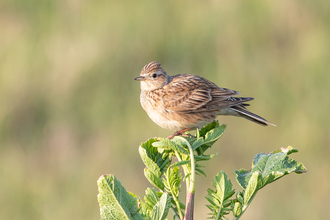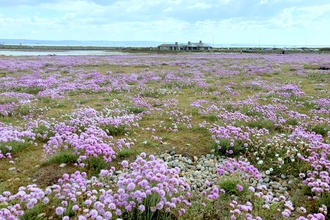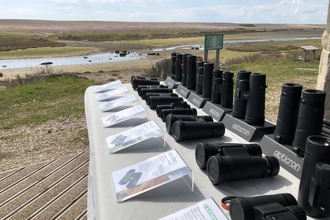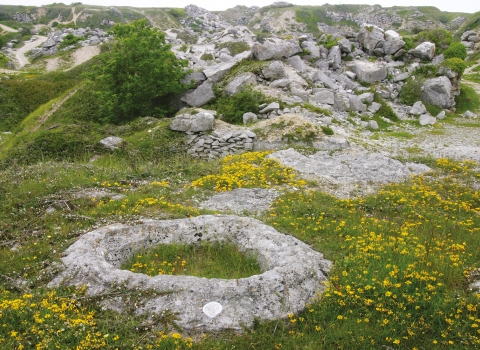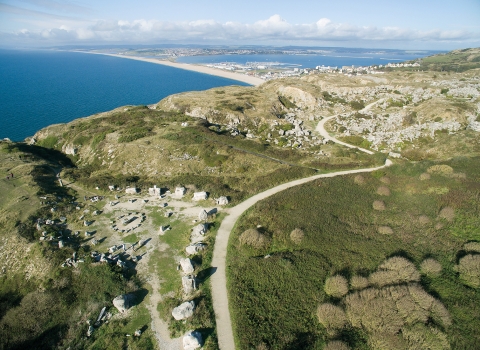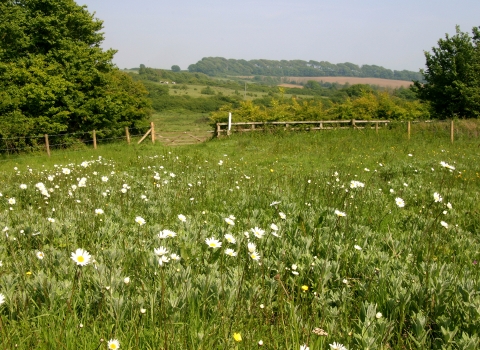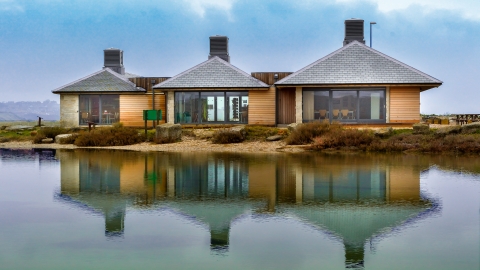
The Chesil Centre by Marc Kativu Smith
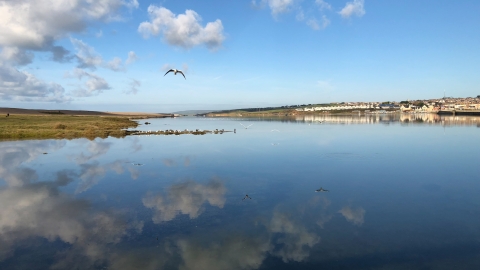
The Fleet Lagoon by Marc Kativu Smith
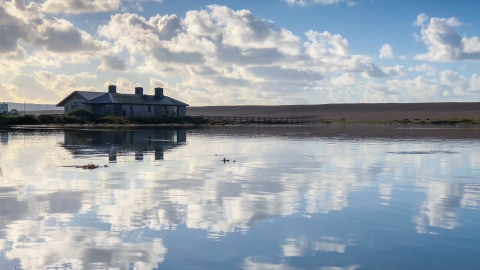
The Chesil Beach Centre from the Fleet Lagoon by Marc Kativu Smith
The Fine Foundation Wild Chesil Centre
Location
Know before you go
Dogs
Please keep dogs on leads around the edge of the Fleet Lagoon and on the sandflats where birds are resting and feeding. Click here for more information and guidance about dogs on Dorset Wildlife Trust nature reserves.
When to visit
Opening times
The Wild Chesil Centre and Pebble Pig café are open 7 days a week throughout the year except for Christmas and Boxing Day.Opening Hours: 10am – 4pm.
Fleet Explorer boat trips run from April to September.
Best time to visit
All year roundAbout the reserve
Chesil Beach and the Fleet are important areas for wildlife and have national and international protections. Chesil Beach, near Weymouth, is 18 miles long and is the largest tombolo in the UK. The Fleet Lagoon is the largest tidal lagoon in the UK and one of the most important Marine Protected Areas (MPA) in the country.
It features important areas for bird life, which include dunlin, oyster catchers, little egret and ringed plover as well as hundreds of brent geese and other migrating and wintering wildfowl. In spring, there is a rare colony of little terns which breed on the beach. In May, the shingle turns into a sea of pink, as thrift stretches along the pebble bank. Sea campion, kidney vetch, yellow horn poppy and other coastal specialists can also be found. Hares live and and breed on the beach and rarities like the scaly cricket and DeFolin's lagoon snail thrive along this unique shingle habitat.
Our family-friendly visitor centre has displays about the wildlife, formation and history of the world-famous Chesil Beach and Fleet Lagoon. Join us at our events, go exploring with our wildlife backpacks, try a spot of birdwatching or see what’s washed in on our marine touch table. A walk up the beach reveals stunning 360° panorama sea views of Portland, the Fleet Lagoon, Weymouth, Portland Harbour and Lyme Bay. A boardwalk next to the centre allows easy access onto the beach.
For information about the Chesil Bank and Fleet Nature Reserve including access, permitted activities and wildlife updates click here.
For a wealth of information about the geography, geology and wildlife of Chesil Beach and the Fleet Lagoon, click here.
Hamm Beach, much loved by locals and visitors, and home to a remarkable array of wildlife, including rarities such as the tiny, hopping 'micro' moth Scythris siccella and attractive plants such as Sea Holly. Over the years, the sand dunes have become artificially stabilised, and now there is not enough space for these species. However, all is not lost, as a new partnership project Creating Spaces for Species is working with the landowners and other partners to restore suitable habitat. Find out more about the project
Habitat
Contact us
The Fleet Explorer
Explore Chesil Beach and the Fleet Lagoon by boat, with daily trips during the spring and summer season on the Fleet Explorer. A great way for nature enthusiasts, families and tourists to discover the secrets of the area. The Fleet Explorer is owned and run by Dorset Wildlife Trust.
The Fleet Explorer © Angela Thomas
Pebble Pig cafè
Salt Pig
After all the exploration, the Pebble Pig Café operated by Salt Pig offers the perfect place to relax and refuel. This cozy café with incredible views across the Fleet Lagoon serves delicious locally sourced food, with a focus on seasonal ingredients. Whether you fancy a hearty breakfast, a light lunch, or just a cup of tea with a slice of homemade cake, the Pebble Pig is sure to satisfy.
Shop at the Wild Chesil Centre
We stock a range of wildlife inspired gifts, educational toys, wildlife books and host regular art exhibitions by local artists inspired by Dorset’s wildlife and iconic landscapes. We are also stockists for Opticron, and have a great selection of binoculars, as well as running special optics events throughout the year.
All profits from our shop go directly back into our conservation work, so when you treat yourself, or a loved on, you are treating your local wildlife too.
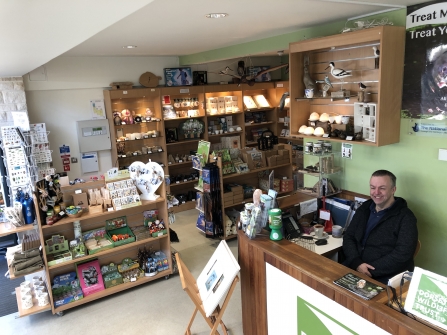
Chesil Centre shop by Marc Kativu Smith
Volunteering at the Wild Chesil Centre
The Wild Chesil Centre is run by a team of local volunteers. If you are interested in wildlife or the local area, and would like to join us, please get in touch. No specialist knowledge is required just enthusiasm and a willingness to learn, help with the Centre and talk to the public.
It’s a great way to meet people, learn about your local wildlife and help support Dorset Wildlife Trust. There is a programme of social and training activities for volunteers, and you can also to attend most of our public events for free!
If you can spare a few hours a week, and would like to find out more, then email: chesilbeach@dorsetwildlifetrust.org.uk or phone us on 01305 206191.
We have lots of volunteering opportunities at Dorset Wildlife Trust. Find out more here.
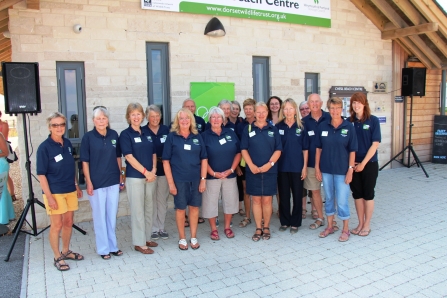
Chesil Volunteers by Emily Brown
Boardwalk Commemorative Plaques
Leave a lasting reminder of what Chesil Beach and its wildlife means to you, or someone special to you. Our stunning boardwalk is the perfect setting in which to commemorate a special occasion, or to honour the life of a loved one.
For £250 you can choose to dedicate a plaque on the boardwalk, which will be engraved to order with wording of your choice.
Your donation will be used to fund our work at the Wild Chesil Centre.
Hamm Beach
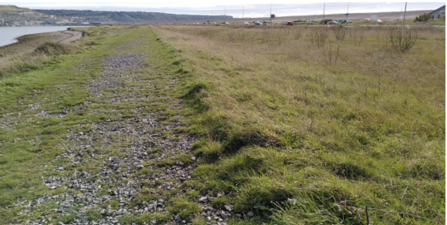
Footprint Ecology
Until relatively recently Hamm Beach was an open expansive area of bare, sandy, soil supporting a wide range of special plants and insects. Plants such as sea holly, sea cat’s-tail and four-leaved allseed have either already disappeared or decreased in number. One particularly important resident of Hamm Beach, the tiny micromoth Scythris siccella, has also potentially been lost from the locality (its only home in the entire UK) due to the change in habitat.
Human activity compounded by the ongoing effects of climate change has driven this change. The construction of Portland Harbour breakwaters and the (now defunct) Portland Branch Railway placed physical barriers upon Hamm Beach’s dynamic processes, stopping sand from being deposited upon the relict dune system that underlies the site. The beach itself has subsequently been covered by expanses of shingle, and a dense thatch of grassy vegetation has taken hold. A thick layer of humus has also built up beneath the tall grasses, with vehicle emissions from the nearby road further enriching the radically altered habitat.
Work has now started to reinstate the lost habitat of Hamm Beach as part of the ‘Creating Space for Nature’ project with the support of Natural England, local conservation organisations and the site owners, Crown Estates. You may notice several small areas of cut and cleared vegetation and sandy patches, which have been undertaken to slow the accumulation of nutrients on site and remove bulky grasses, creating space for open sandy habitats to develop and for the species dependent on them to return.
If you’d like more information on the work being undertaken by the ‘Creating Space for Nature’ project then please contact Footprint Ecology
The Little Tern Project on Chesil Beach
Since 2009 a partnership of organisations have worked together to help the Chesil Beach little tern colony, which had dropped in size from 100 pairs in 1997 to just 10 in 2008. Little terns are graceful seabirds that migrate from Africa to breed on UK beaches in summer. They have started to return to Chesil Beach, the UK’s most south westerly colony.
Little terns at Ferrybridge near Chesil © Angela Thomas

